During the 1910s, over two million Italians immigrated to the United States; among them, Rosario Trovinano from Sicily.
Rosario’s family arranged a marriage for her with Alberto Ciani, a barber, several years her senior. She and Albert married in Syracuse, New York on June 16, 1913. Rosario gave her age as 18, she was 16. Unlike most arranged marriages, the couple never reached a place of mutual respect and affection.

Over twenty years of their married life, Albert beat her and their children—especially the girls whom he seemed to loathe. According to Rosa, Albert “tried to destroy” the girls when they were born. He took them to the beach and pushed them into deep water. Once, when she was pouring milk to feed their youngest child, Gloria, he caught her and threw the milk away. Then he sat down and ate two steaks and a half-dozen eggs while his hungry wife and children looked on.
The couple argued constantly. Florence, their eldest daughter, left home in 1931 to become a beauty operator. She said she often heard her mother and dad “scrapping.” The argument centered on which one of them gave the other one a “dreaded disease,” likely syphilis. The final straw for Florence was when Albert attempted to murder her when she tried to intervene in one of their arguments. The D.A. dropped the charges against Albert when Rosa, afraid of the consequences, declined to testify.
On Sunday evening, September 10, 1933, after another bitter fight, Albert told Rosa she need not finish the preserving she was doing because she would not be there long, and neither would the children. Would he make good on his threats to kill them? Albert went to the bedroom to sleep. In her nightgown, Rosa slipped into the kitchen, heated some coffee, and poured a large measure of olive oil into a pot. She waited. When the oil reached the boiling point, she took the pot into the bedroom and poured the contents into Albert’s eyes.
Screaming in agony, Albert stumbled around the room. Rosa picked up the axe she had purchased with $1.50 Florence gave her. Raising the heavy blade above her head, she struck. The first blow cleaved Albert’s back and punctured a lung. The second strike sliced his shoulder, almost completely severing an arm.
As their children, Catherine, Susan, and Samuel, looked on in horror, Rosa continued the attack. The children pleaded with her to stop. She quit only when Albert fell unconscious to the floor after she hacked his legs out from under him.

Answering the horrified calls of neighbors, Detective Lieutenants Connor and Patton arrived at the Ciani home at 10464 South Hoover Street. They rushed Albert, who was on the brink of death, to the Georgia Street Receiving Hospital, where he succumbed within minutes.
The police found Rosa outside the home. She kissed her children goodbye, then surrendered to the police outside the home. They transported her to Lincoln Heights Jail. Later, from her cell, a defiant Rosa said, “I’m glad I did it. I’d kill him even now to protect my children and myself!”

The coroner’s jury found she had killed Albert by pouring four gallons of boiling oil on him and hacking him with an axe. Public defender John J. Hill was assigned to represent Rosa.
In December, three alienists, Drs. Paul Bowers, Victor Parkin, and Edwin Wayne reported to Judge Fletcher Bowron. They agreed Rosa was sane when she killed Albert. They explained the crime, saying she was “driven to distraction” by her husband’s brutality. Judge Bowron granted Hill’s request for a continuance and set the trial for January 25, 1934. Hill hinted Rosa might change her plea to guilty.
On January 25, 1934, over the objections of her daughter Florence, Rosa pleaded guilty to manslaughter before Judge Burnell. The judge delayed the sentence until the following day. Rosa’s family and friends would testify to the mitigating circumstances that caused her to snap.

Judge Charles Burrell sentenced Rosa to San Quentin for manslaughter; but stated he wished he could give her probation. He requested the state board of prison terms and paroles to show compassion for the defendant in an unexpected move. He said for years Rosa had endured cruel treatment at Albert’s hands, including repeated beatings, choking of her children, and the willful withholding of food, while he feasted in front of them. Judge Burnell supported her attorney, John J. Hill. Hill urged for Rosa’s immediate release and recommended that Governor James “Sunny Jim” Rolph grant executive clemency.
The Governor listened, and on April 26, 1934 he commuted Rosa’s sentence to time served.

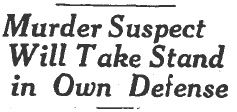 Gray was scheduled to take the stand on November 2nd but he was too ill to appear in court. The trial was delayed for a few days until it was decided that if Gray couldn’t come to court, the court would come to him. The trial resumed at Gray’s bedside in the County Jail Hospital.
Gray was scheduled to take the stand on November 2nd but he was too ill to appear in court. The trial was delayed for a few days until it was decided that if Gray couldn’t come to court, the court would come to him. The trial resumed at Gray’s bedside in the County Jail Hospital.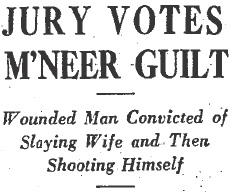
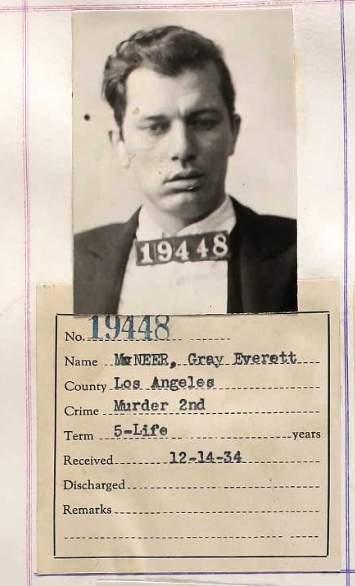 Gray was taken to Folsom Prison to begin serving his sentence of from 5 years to life. Gray’s mother said there was no plan to file an appeal. But plans change.
Gray was taken to Folsom Prison to begin serving his sentence of from 5 years to life. Gray’s mother said there was no plan to file an appeal. But plans change.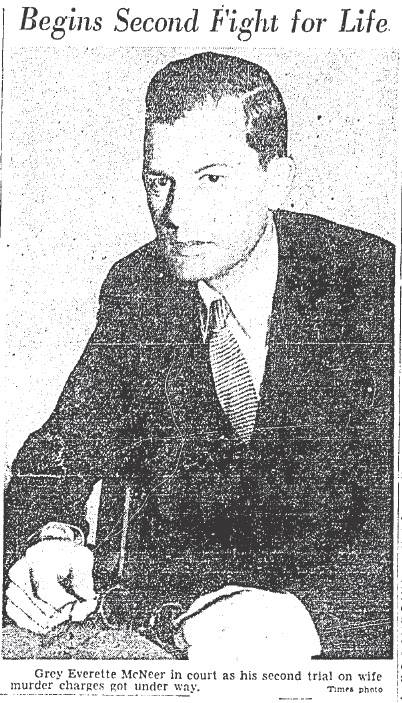
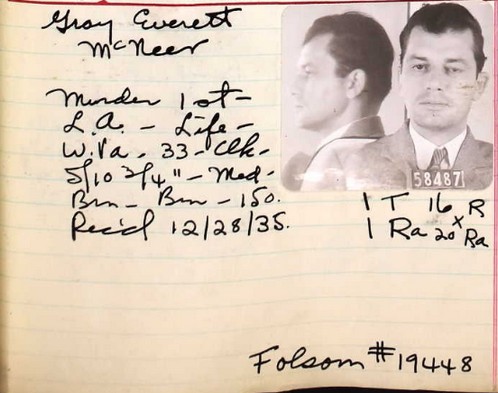
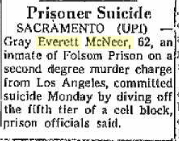
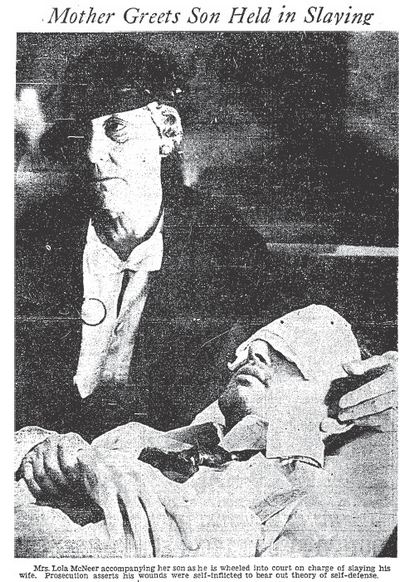 Gray’s mother, Lola, remained at her son’s bed side and on August 24th it was reported that she had given her official consent for an operation to remove the bullet from his brain. It isn’t clear why a man in his 30s would need his mother’s consent, but it may have been that he was in no condition to give it himself. S.S. Hahn told the court that in his present condition Gray was in imminent danger of death and that, even if he survived, he might be become “an imbecile.” The operation was given odds of 100 to 1 that it would succeed; but it was Gray’s only hope.
Gray’s mother, Lola, remained at her son’s bed side and on August 24th it was reported that she had given her official consent for an operation to remove the bullet from his brain. It isn’t clear why a man in his 30s would need his mother’s consent, but it may have been that he was in no condition to give it himself. S.S. Hahn told the court that in his present condition Gray was in imminent danger of death and that, even if he survived, he might be become “an imbecile.” The operation was given odds of 100 to 1 that it would succeed; but it was Gray’s only hope.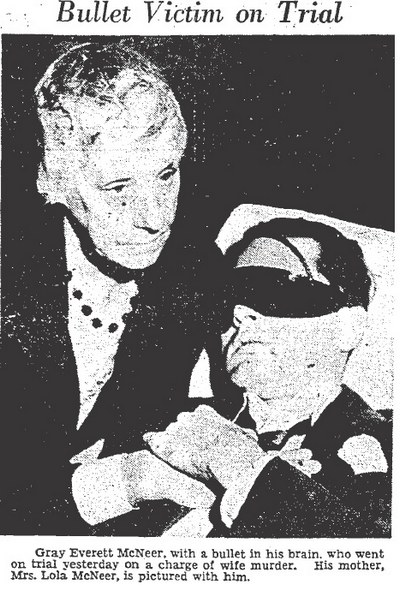 Hahn objected to the Judge’s admonition and there was a short recess. Once back in the courtroom, Judge Burnell spoke to the jury: “Ladies and gentlemen of the jury, I am making this statement to you at the suggestion and with the consent of counsel for both sides, the People and the defendant. You, of course, could not help but observe the fact yesterday afternoon that the defendant was making more or loess noise, talking and groaning, and the Court made some remarks about ceasing the theatricals, or something of that sort. That, of course, is something that you haven’t any business to pay any attention to, and I want you to entirely disregard it. The defendant is here on trial for one specific offense, and all the jury have any right to consider whatever is the evidence in the case and nothing else. I know you will appreciate that and be able to do that, but for your information, in view of the apparent condition of the defendant, I am trying now to get hold of Dr. Blank, the jail physician, to come down here and tell us whether he thinks from his examination of the defendant there is any reason why the case should not continue. In other words, whether or not the defendant is in a condition physically and mentally that will preclude going ahead with the trial. Until we hear from Dr. Blank, we will go ahead, and if there is any demonstration on the part of the defendant, you will disregard it. You are not here to try anything except the facts in this case.”
Hahn objected to the Judge’s admonition and there was a short recess. Once back in the courtroom, Judge Burnell spoke to the jury: “Ladies and gentlemen of the jury, I am making this statement to you at the suggestion and with the consent of counsel for both sides, the People and the defendant. You, of course, could not help but observe the fact yesterday afternoon that the defendant was making more or loess noise, talking and groaning, and the Court made some remarks about ceasing the theatricals, or something of that sort. That, of course, is something that you haven’t any business to pay any attention to, and I want you to entirely disregard it. The defendant is here on trial for one specific offense, and all the jury have any right to consider whatever is the evidence in the case and nothing else. I know you will appreciate that and be able to do that, but for your information, in view of the apparent condition of the defendant, I am trying now to get hold of Dr. Blank, the jail physician, to come down here and tell us whether he thinks from his examination of the defendant there is any reason why the case should not continue. In other words, whether or not the defendant is in a condition physically and mentally that will preclude going ahead with the trial. Until we hear from Dr. Blank, we will go ahead, and if there is any demonstration on the part of the defendant, you will disregard it. You are not here to try anything except the facts in this case.”